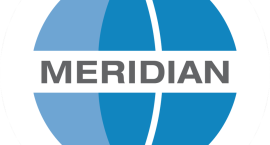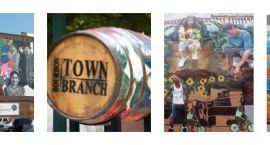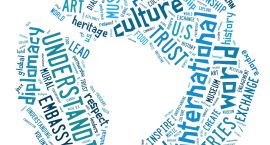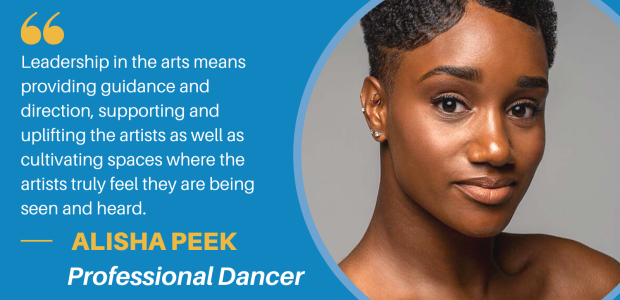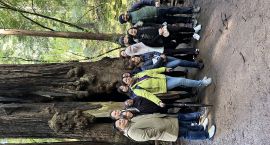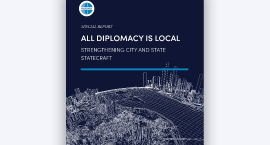Alisha Rena Peek is a graduate of the Ailey/Fordham BFA Program in Dance, and former company member of Ailey II, the second company to the world renown Alvin Ailey American Dance Theater. She gave a virtual performance at our MeridianOnline event, Dance Diplomacy, about the impact of the pandemic on the performing arts industry, in May 2020.
Who are some of the mentors that have inspired you in your career?
One of the mentors that I’ve worked with in the past, and someone I’ve just finished doing a residency with, is Hope Boykin. She is a former company member of the Alvin Ailey American Dance Theater, and she was with them for about 20 years. We first met before an audition for Memoria, in which she pulled me aside to talk before I went in. Shortly after that encounter, I applied to be in the ASAP mentorship program through the Ailey School, which matches company members with students in the school, and I happened to be paired with her – which I found kind of crazy because of her stature and just who she was. I found that when we met, we had a lot of similarities, and we were able to discuss and get to know each other more, not just as dancers, but as people outside of dance. She has inspired me in so many ways. She is a true visionary, and being able to work with her recently — I mean, I’ve seen her dance over the years but to be able to be in a room with her, where she’s able to create a piece, and put her full self into it – is truly mind blowing. She has done so much for the arts and for people, which has inspired me in so many different ways. She has been a guiding light for me even through this ‘newness,’ as she likes to call it — being in this pandemic and trying to figure out how to navigate this space as dancers and continue to stay inspired.
Someone I’d also like to highlight is Fana Tesfagiorgis. I’m currently working with her through Black Dance Change Makers. She’s a former dance company member of the Alvin Ailey American Dance Theater as well but is currently performing with the touring company of My Fair Lady. I knew her in passing through being at the Ailey School, but really got the chance to know her through this pandemic. This was a blessing in disguise–getting to know her on a personal level and getting to pick her brain a little bit about being in the industry, about her journey and her path, and also about how she has navigated being a Black woman, especially during this time and in this space. She has given me so much advice on how to tackle the goals that I want to achieve during this time and later down the line, while also assuring me that I always have access to her. Fana is just so giving in that way.
The last person I would like to spotlight is Sharron Lynn Williams, who I’ve known for a very long time. She was working on The Lion King on Broadway when I met her, and she choreographed a piece for me during my freshman year of high school for the talent show, and she’s been a mentor to me ever since. She has really helped me to figure out life in New York City, and she told me to audition for the Ailey Summer Intensive. She was a former Ailey II member, and I truly appreciate being able to talk to someone that’s walked the path and can shed some light.
What does leadership in the arts mean to you?
Leadership in the arts means providing guidance and direction, supporting and uplifting the artists as well as cultivating spaces where the artists truly feel they are being seen and heard. Most influential leaders embody these qualities and apply them on a regular basis. To be our best, artists need to feel they are strongly supported, uplifted and considered an active participant in helping the company achieve its goals. Regarding cultivating a space where artists feel both seen and heard, a sense of safety in the work environment is very important. Dancers must feel comfortable enough to engage in open dialogue with their leadership and freely express any areas of concern. Honestly, I think artists are having more conversations regarding this topic as we recognize the opportunity for growth and change. Leadership in the arts has improved but there is much more work that needs to be done.
How has being a Black woman shaped your experience in the dance industry?
Well, thankfully, being at the Ailey School, I’ve seen so many strong Black women come through the organization who have been instrumental in my development and willing to take me under their wings. I have been blessed in the sense that they have helped me to navigate being a Black woman and Black artist in the dance industry. But not everybody’s journey is the same. When it comes to mentorship and when speaking with my students who are primarily young Black girls, because I had that mentorship in the beginning, I was to not only able to understand what it meant to be a Black artist in my field, but I was also able to fully comprehend what it means to be a Black woman in my line of work. Mentorship is near and dear to my heart and being able to share my lived experiences with my students — so that they’re able to see through my lens, what I’ve gone through and how they can navigate different spaces as they’re evolving into artists — is a highlight of my life. There are certain things we experience as Black women, and as a Black woman who is a performing artist, I to walk my students through some of the experiences that I’ve specifically gone through to help prepare them for the realities of the industry so they’re not shocked when they begin their journeys.
How has the pandemic impacted your career and how have your mentors supported you through this challenging time for the arts?
In March 2020, I had just come back from touring in Germany and Italy, and also performing in Miami and New Orleans. I was still dancing with Ailey II, and we still had a few months’ worth of performances, speaking engagements and appearances to go. Everything was put on pause, but then everything eventually came to an abrupt end. It was definitely a culture shock coming back to Maryland. I left Maryland with the intention that I was making my life and creating my life in New York City. Though this pandemic has kind of flipped my world upside down, I’m grateful to be able to have the opportunity to be able to teach at a couple different studios, give masterclasses and do speaking engagements to share my journey of being in the company. It has been challenging, especially when it comes to training for myself. Even though the world hasn’t fully opened up yet, I am questioning how can I continue to stay prepared? I’m doing workouts and taking ballet classes, but sometimes you just don’t want to do those things. And it doesn’t make you less of an artist — that’s something that I have found that has been emotionally and mentally challenging. I may not be where I was a year ago, but I also have to be okay with where I’m at right now. And although I may not be taking class every day, that doesn’t mean I want this any less. My mentors are going through some of the same emotions that I’m going through, so it’s nice to know that I’m not alone and that the things that I’m feeling are valid. Although there is a mentor-mentee relationship, right now it feels like we’re supporting each other in a way that we’re reciprocating the same energy, almost like a sister-sister type of thing. I have the utmost respect for all of my mentors and the way they have been able to help me understand my emotions and that they are not permanent. I love to dance and that’s a matter of fact, so I’m using these feelings to ignite the fire within me and keep that drive going.
What do you think the long-term impacts of COVID-19 will be on the performing arts?
We have to rethink what the dance industry is going to look like a little bit. We’ve shifted to this virtual world, and though it has been challenging, I think it has truly been beneficial in being able to share work in a new way. We’re utilizing this new medium because we have to, but I think it should be implemented in the future. Through streaming the work I did recently with Hope Boykin, so many of my family members were able to see me perform though they have not had the chance to in years. We need to ask ourselves what virtual technologies can do for performances in the long term and how we can grow the audience and the member base by utilizing this tool to reach more people?
In terms of other things like partnering, contact with other artists and having a certain level of connectivity. Will that change? I’m not necessarily sure. I think it’s going to be a process. But I also think we’re open to change and ready and willing to explore what partnering may look like post-pandemic.
What advice do you pass along to other young women entering careers in dance?
I would say don’t lose sight of who you are. As long as you stay true to yourself, understand who you are, and are comfortable and steadfast in your values, the sky’s the limit for you. I appreciate that I was able to have mentors who shared those sentiments with me, because I think it stands true. You have to be your true authentic self within this field, there’s nothing that people value more.
Alisha Peek has performed and taught both internationally and domestically while in the company and has worked with many influential choreographers such as Robert Battle, Hope Boykin, Andrea Miller, Darrell Grand Moultrie, Kirven Douthit- Boyd, and Juel D. Lane to name a few. Ms. Peek began her formal dance training at the Washington School of Ballet and later went on to train at Dance Theatre of Harlem Kennedy Center Residency, Kirov Ballet Academy, and The Art of Technique under the direction of Troy D. Brown. Ms. Peek attended summer intensive programs at American Ballet Theatre, Dance Theatre of Harlem (scholarship recipient), Boston Ballet (scholarship recipient), Hubbard Street Dance Chicago, and The Ailey School (scholarship recipient). She has also appeared in season one of the hit FX series POSE.









